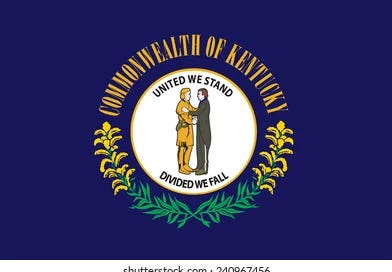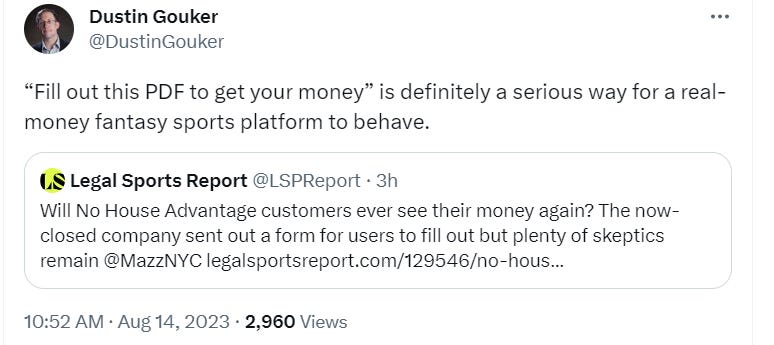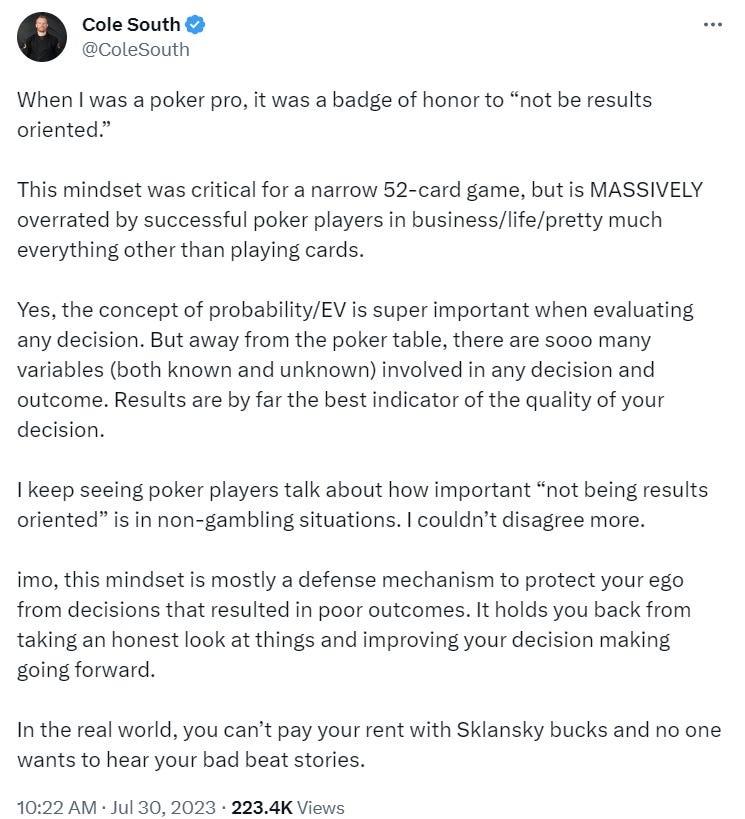Planting Flags In Kentucky
Kentucky is hurtling towards its sports betting launch. The market is beginning to take shape following the first batch of license applications, which is interesting for who did and didn't apply.
The Bulletin Board
NEWS: 7 operators have filed sports betting licensing applications in Kentucky.
BEYOND the HEADLINE: KY Gov. Andy Beshear hitched his wagon to sports betting, and that gamble is paying off.
NEWS: NH significantly raises betting caps and table stakes at charity casinos. Is online casino on the 2024 agenda?
NEWS: Another federal bill targets online gambling advertisements.
NEWS: West Flagler will continue its lawsuit to stop Florida sports betting, files for rehearing en banc.
AROUND the WATERCOOLER: Restitution via PDF and dealing with risk at and away from the poker tables.
STRAY THOUGHTS: Your bias is showing.
SPONSOR’S MESSAGE - Underdog: the most innovative company in sports gaming.
At Underdog we use our own tech stack to create the industry’s most popular games, designing products specifically for the American sports fan.
Join us as we build the future of sports gaming.
Visit: https://underdogfantasy.com/careers
First Batch of Kentucky Sports Betting Licenses
Seven operators have applied for a Kentucky sports betting license. The first batch comprises, Bet365, Circa, Penn (ESPN Bet), Caesars, DraftKings, FanDuel, and BetMGM.
Rush Street Interactive, Bally’s, Hard Rock, and Fanatics are notable operators missing from the list.
As many as 27 online licenses are available, as each of the state’s nine racetracks can partner with up to three sports betting operators. During a scheduled press conference on Thursday, Gov. Andy Beshear said he expects more applications to come in. However, considering the Kentucky market's opportunities, the final number is likely closer to ten.
Thus far, seven of the nine tracks have also applied for a retail betting license:
Churchill Downs, Louisville
Cumberland Run, coming soon to Corbin
Ellis Park, Henderson
Oak Grove Gaming and Racing, Oak Grove
The Red Mile, Lexington
Sandy’s Gaming and Racing, coming soon to Ashland
Turfway Park, Florence
The Kentucky Horse Racing Commission (KHRC) is reviewing the license applications and could vote on the licenses during a meeting on August 22.
Beyond the Headline: Beshear’s Sports Betting Gamble
The accelerated timeline could have something to do with the upcoming gubernatorial election in Kentucky (the state holds off-year elections). One of Beshear’s platforms in his 2019 campaign was his support of legal gambling.
Beshear vocally supported gambling in his 2019 run for governor.
After assuming office in 2020, Beshear said, "My hope, moving into the future, is that we can embrace full, expanded gaming to compete with Indiana, Ohio, and the rest of our neighbors, Republican-led states that are taking Kentucky dollars.”
In 2022 the Gov. said, “I’m 100% for sports betting, Beshear said in 2022. “Pushed it every year I’ve been governor and as I was attorney general. Need a few people in the general assembly to come around. There are a whole lot of them here tonight. Hopefully, they like what they see.”
“Now, after years of urging action, sports betting is legal in Kentucky. We finally did it! Today’s result shows that hard work pays off,” Beshear said after signing sports into law in March. “Kentuckians will soon be able to place their bets here, and for the first time, we are going to keep those dollars here to support our economy and communities.”
Beshear is safely ahead in the polls, but he’s below the magical 50% threshold, and Kentucky is a red state, which means no lead is truly safe. Yes, it’s been legalized, but pointing to physical sportsbooks and mobile sports betting app provides a promises-kept opportunity for Beshear, which would be a rare political win for a Democrat governor in a red state.
Stakes are Raised in New Hampshire
While all eyes were on Rhode Island’s foray into online casino gambling, another New England state passed a fairly consequential gaming law.
New Hampshire’s charity casinos can now offer dramatically higher-stakes games following the passage of SB 120. Table game bet caps were increased from $10 to $50, and more importantly, for poker players, table stakes have been increased from $150 to $2,500.
Per the bill:
No single wager by a player, on any game of chance, shall exceed the amount of [
$10] $50… In any such "table stakes" game, the amount of chips a player may purchase during the course of play in said game shall be no greater in value than [$150] $2,500.
The big question in 2024 is can New Hampshire push an online casino bill across the finish line? This year’s efforts were derailed by the state’s charity casinos, who fear cannibalization. The New Hampshire Charitable Gaming Operators Association (NHCGOA) opposed efforts despite several attempts at a compromise, including removing online slots from the bill.
There were some murmurs of a 2024 compromise during the NCLGS conference in July, where State Sen. Tim Lang said, “I think we will see an iGaming bill pass in New Hampshire in ’24.”
However, the NHCGOA’s idea of a compromise is direct involvement, according to Rick Newman, who represents the NHCGOA.
“If online gaming is going to come to New Hampshire, the charitable gaming operators want to have it under the umbrella of the current gaming in New Hampshire,” Newman told Play USA.
Sponsor’s Message - The geolocation data and device insights you need to fight fraud
Trusted by the world’s leading platforms and operators for over 10 years
The OneComply 360° licensing management solution
Industry-leading KYC pass rates of 95%
The gold standard of geolocation for barring sanctioned countries
The most comprehensive global database of devices linked to fraud
Our offering is cost neutral because our operators avoid fines and fraud-related losses and increase profits
Florida Sports Betting Is Back On Hold (for now)
Monday was the deadline for the Florida cardrooms (collectively known as West Flagler) to file an appeal with the DC Court of Appeals. If the cardrooms failed to file an appeal, the Seminole Tribe could have relaunched its Hard Rock mobile betting app by the end of the month.
West Flagler has decided to forego a panel rehearing and instead filed for an en banc review of the case, meaning, if granted, the entire DC Court of Appeals (with the exception of four judges who have senior status) would decide the case.
The “if granted” is doing a lot of work, as en banc reviews are rarely granted, and with just 11 judges on the panel and three of those judges already ruling against West Flagler, it’s unlikely the en banc review will be granted, and even more unlikely they will reverse the previous decision.
Still, even if the court rejects the en banc review, the likely earliest return of mobile sports betting would be sometime in mid-September. And, of course, West Flagler could take their appeal to the Supreme Court.
In a statement, the Seminole Tribe sounded felt confident the court would take their side, saying, "It’s important to note the three Judge panel of the U.S. Court of Appeals for the District of Columbia Circuit issued a unanimous decision in favor of the U.S. Department of the Interior, which approved the Gaming Compact between the Seminole Tribe and the State of Florida."
Congressional Interest in Online Gambling
I’ve been tracking federal interest in gambling (and specifically sports betting and online gambling) since the repeal of PASPA in 2018, and let’s just say the temperature keeps getting turned up.
The Kids Online Safety Act (S 1409) is yet another sign that Congress is paying closer attention to what is happening in online gambling than many believe.
The act is a wide-sweeping attempt to protect minors on the internet. It contains two references to gambling:
In Section 3: Duty of Care:
(a) Prevention Of Harm To Minors.—A covered platform shall act in the best interests of a user that the platform knows or reasonably should know is a minor by taking reasonable measures in its design and operation of products and services to prevent and mitigate the following:
[…]
(5) Promotion and marketing of narcotic drugs (as defined in section 102 of the Controlled Substances Act (21 U.S.C. 802)), tobacco products, gambling, or alcohol.
And in Section 4: Safeguards for Minors:
(d) Advertising Of Illegal Products.—A covered platform shall not facilitate the advertising of narcotic drugs (as defined in section 102 of the Controlled Substances Act (21 U.S.C. 802)), tobacco products, gambling, or alcohol to an individual that the covered platform knows or reasonably should know is a minor.
Why it matters: The Kids Online Safety Act was also put forth in 2021-2022, and as is the case this session, it didn’t gain momentum. However, advertising will undoubtedly be a topic of interest if Congress looks into any aspect of online betting: betting by athletes, illegal offshore operators, Rep. Paul Tonko’s interest in gambling advertising, or the policies the NCAA and professional sports leagues have in place.
Sponsor’s Message - Jackpocket, America’s #1 lottery app, is proud to partner with Spectrum Gaming Group to release “The Future of Lottery Courier Services,” a report outlining consensus-driven best practices for the industry. Implementing these common-sense measures will help ensure transparency, accountability, and consumer protection, while continuing to sustainably grow the US lottery market without compromising its integrity.
Read the report here: https://blog.jackpocket.com/spectrum-gaming-report-on-the-future-of-lottery-courier-services/
Around the Watercooler
Social media conversations, rumors, and gossip.
The No House Advantage story has been flying under the radar, but Legal Sports Report has done a great job covering it (latest here).
This tweet by @ColeSouth spoke to my thoughts on this subject, and I felt it was worth sharing.
Stray Thoughts
I remember many observers saying, “They are rarely granted, but…” when New Jersey filed for an en banc review in the PASPA case. The en banc hearing was granted at the end of the day, but as noted above, New Jersey lost 9-3.
In the West Flagler case, observers don’t want the Court of Appeals to grant an en banc hearing, and the “but” part is being left out of any analysis.
That doesn’t mean there aren’t stark differences between the two cases or that I expect the request to be granted, but it does highlight something we should all be careful of, letting our hopes bias our analysis.









